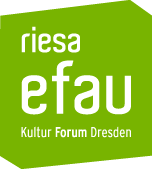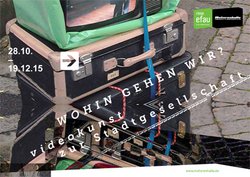Motorenhalle. Projektzentrum für zeitgenössische Kunst
Wohin gehen wir?
videokunst zur stadtgesellschaft
Ausstellung, Vernissage
Mittwoch, 28.10.2015, 20:00 - 23:00 Uhr
Motorenhalle, Wachsbleichstraße 4a, 01067 Dresden
Eröffnung: Mi, 28. Oktober 2015, 20 Uhr Dauer: 29.10. bis 19.12.2015 Öffnungszeiten: Di-Fr, 16-20 Uhr, Sa und feiertags 14-18 Uhr, So + Mo geschlossen am 17.11. Ausstellung nur bis 18 Uhr geöffnet
Als roter Faden dient immer die Frage nach der Entwicklung von Formen des städtischen Zusammenlebens, die nicht den Kampf von Egoismen, sondern gemeinwesenorientierte Ideen in den Mittelpunkt stellen. Dies schließt sowohl politischen wie auch bürgerschaftlichen Disput und Streit ein wie auch die Respektierung von Grundregeln gegenseitiger Kommunikation. Aber natürlich auch das Wissen darum, dass bei diesen Diskussionen ganz wesentlich auch der Weg, der Umstand, dass diese überhaupt geführt werden, das Ziel ist. Mit anderen Worten, insbesondere für den diskursiven Teil des Projekts besteht das Ziel darin, im Kontext mit anderen Vorhaben und Initiativen einen Beitrag zum Gespräch in der und über die Stadt und ihre gegenwärtige und künftige Verfasstheit zu leisten.
Künstler_innen: Peter Aerschmann, CH | Roberto Andreoli, BR | Alan Aranha/ Bharat Mirle, IN | Anna Baranowski, DE | Piotr Blajerski, PL | Nisrine Boukhari, SY | Ulu Braun, DE | Marina Chernikova, NL | Aitor Marín Correcher, ES | Sirin Bahar Demirel, TR | Song Di, CN | Daniel Nicolae Djamo, RO | Johanna Domke, DK | Sonja Feldmeier, CH | Andreas Fogarasi, AT | Lucie Freynhagen, DE | Denise Ackermann, DE | Ingeborg Fülepp/ Heiko Daxl, AT | Ivan Garcia, ES | Romain Gavras, FR | Maria Gonchar, UA | Manaf Halbouni, DE | Lorenz Fidel Huchthausen, Robert Esteban-Schäuble, DE | Erdal Inci, TR | Ahmed Kamel, DE | Ada Kobusiewicz, PL | Milan Kohut, CZ | Zhenchen Liu, CN | Alex Markov, RU | Tomas Moravec, CZ | Joas Sebastian Nebe, DE | Peter Nestler/ Reinald Schnell, DE | Margarita Novikova, RU | Christoph Oertli, CH | Hein-Godehart Petschulat, DE | Sebastian Helms, DE | Gustavo Postiglione, AR | Jonathan Rescigno, FR | Kristoffer Rus, PL/ SE | Jani Ruscica, FI | Habib Sadaat, AF | Hans Schabus, AT | Juliane Schmidt, DE | Jonathan Seyer, US | Gertrud Schulte Westenberg/ Matthias Coers, DE | Elías León Siminiani, ES | Rhayne Vermette, US | Sylvia Winkler/ Stephan Köperl, DE | Yaroslav Yanovsky, UA Jacek Zachodny, PL | Florian Zeyfang/ Alexander Schmoeger/ Lisa Schmidt-Colinet, DE
Kurator_innen: Denise Ackermann, DE | Jolanta Bielanska, PL | Frank Eckhardt, DE | André Werner, DE (unter Mitarbeit von Julia Murakami und Klaus W. Eisenlohr)
Eröffnung: Mi 28. Oktober 2015, 20 Uhr
Dauer: 29.10. bis 19.12.2015
Öffnungszeiten: Di–Fr 16–20 Uhr, Sa und feiertags 14–18 Uhr, So + Mo geschlossen Where are we going to? Videoart on the City phenomenon. Video, discussion, reading, workshop, music and more on different forms and times of social presence and future in the City. Curators: Denise Ackermann, Jolanta Bielanska (PL), Frank Eckhardt, André Werner (with the collaboration of Julia Murakami and Klaus W. Eisenlohr) The project is a collaboration with Directors Lounge Berlin Although the first part of the title that is borrowed by Gauguin and shimmers between pathos and esoteric for today's eyes, ironically treats the idea to be able to give real answers to this question, but we believe that we can counterpoint it with Willy Brandt: The best way to predict the future is to shape it. Especially in Dresden within the urban population trenches of incomprehension have been breaking open again about essential future issues. These preclude a bitter required lived and wider civically culture of discourse. Other areas of development, such as imagined future technical or scientific innovations, will not directly be subject of the project, but surely in their intended impacts on the life and work of urban society. Because of the flexibility and relevance of the medium video works mainly of recent times on the current status and anticipated future developments of urban civil societies will be shown. Tensions will not only be addressed and discussed in the exhibition but in the whole programme. These result from a bondage by the past, from restrictions imposed by the capitalist system or from an individual or cross immobility on the one hand and the unalterable changes, the attempts to form them as a subject, the advent of new and unfamiliar on the other hand. Distinguishing from purely political statements the project will deal with art, that means openness, indecipherable things, curiosity. The transitions between art and political commitment as well as social intervention by artists are fluent not only in today's art scene. Of course, it always comes to the great and all. But since the civic dispute revolves not only around the principles of cooperation, but more often to everyday and small mosaic of coexistence, the big issues will also be treated in the artistic contributions that are often based on supposedly minor elements that make up the city and urban society: the kind of movements in the city, nightlife or graffiti, resistance, moral cowardice and intermediate stages, theatre, music, houses, brownfields or gardens. The city as a stage for its inhabitants, for those of the environment, for their guests. The city as a place of work, progress, science. It’s about living, the traffic, the exchange in the city. And about the always new exciting relationships between many in itself differently individual, milieu-, level- or class-related and across experiences, wishes, expectations within the limited geographical and social space of the city. Although it is important to the curatorial team of the project, as indicated above, to include playfully many different aspects of the city in the discussion within the project. However, a red thread will always be the question of the development of forms of urban coexistence that do not constitute the battle of egos, but concentrate on community-oriented ideas. This includes both political and civic dispute and contention as well as a respect for the principles of mutual communication. But of course, also the knowledge that at these discussions very significantly also the way, the fact that they are lead at all, is the goal. In other words, in particular for the discursive part of the project, in the context with other projects and initiatives the goal is to make a contribution to the conversation in and about the City and its current and future constitution.
keine Termine gefunden











